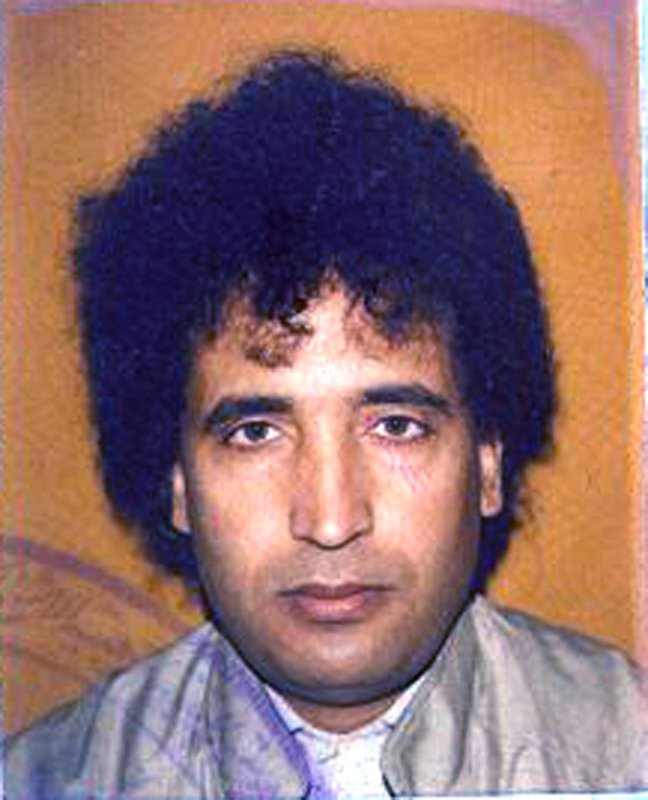In a photo released by the Crown Office, Lockerbie bomber Abdel Basset al-Megrahi, the Libyan man who was convicted of the deadly 1988 bombing of Pan Am Flight 103, is shown in his passport picture on August 20, 2009. Al-Megrahi, diagnosed with terminal cancer, was released today by Scottish officials on compassionate grounds and returned to Libya. UPI/Crown Office |
License Photo
TRIPOLI, Libya, Dec. 15 (UPI) -- Libya's hopes of new oil strikes in the Gulf of Sidra have been set back by BP's postponement of launching a $1 billion deep-water exploration program as the company grapples with the aftermath of the huge Gulf of Mexico oil spill.
International oil companies, lured by the prospect of hitting it big in the Mediterranean country which has the largest proven reserves in Africa, have rushed to Libya since U.S. and U.N. sanctions were lifted in 2004.
BP was to start drilling the first of seven wells in the Gulf of Sidra in November despite widespread concerns about safety and environmental record following the April 20 disaster at the Macondo well in the Gulf of Mexico.
But the company has announced it now plans to do that in 2011 because it has decided not to use its original drilling platform for unexplained "operational reasons."
According to the Financial Times, the initial well in the Gulf of Sidra, where U.S. and Libyan forces clashed in the 1980s, is some 600 feet deeper than the Macondo well. BP and other oil companies have drilled to much greater depths but the Macondo disaster has haunted the British oil group with concerns about a similar ecological catastrophe.
BP says it's changing rigs from one owned by the U.S. Noble Corp. to one being readied in the Gulf of Mexico and owned by Pride International.
"We've been using what we learned in the Gulf of Mexico to ensure operations are safe and sometimes delays can happen," the company declared.
Libya's reserves, the ninth largest in the world, total 41.5 billion barrels of oil. Current production is around 1.8 million barrels per day.
Libyan leader Moammar Gadhafi's Tripoli regime wants to boost that to 3 million bpd by 2010-13 but, with existing fields declining, it needs to find new fields soon.
At current production rates, Libya's reserves will last for another 63 years even if no new strikes are made.
The bulk of current output comes from onshore or shallow-water fields, so Tripoli is looking to the Gulf of Sidra to provide the new deep-water fields it seeks.
BP is committed to spending $1 billion onshore and offshore over the next seven years under a controversial $900 million exploration contract it signed with Gadhafi in May 2007.
The British oil giant, booted out of Libya with other foreign oil companies when Gadhafi seized power in 1979, has estimated the deal could lead to eventual investment of $20 billion in the onetime pariah state.
But the Gulf of Sidra contract has come under U.S. scrutiny, along with BP's actions in the Gulf of Mexico.
In July, as BP grappled with the Gulf of Mexico disaster, U.S. lawmakers alleged that deal was linked to Britain's August 2009 release of a former Libyan intelligence agent, Abdelbaset Al-Megrahi, from a Scottish prison, and demanded an investigation.
Megrahi served eight years of a life sentence for blowing up a Pan Am jumbo jet over Scotland Dec. 21, 1988. All 259 people aboard the New York-bound jetliner, including 189 Americans, were killed. Another 11 were killed by wreckage that fell on the town of Lockerbie.
Britain adamantly denied there was any linkage. BP has denied it lobbied British authorities to free Megrahi on compassionate grounds because he was suffering from prostate cancer to persuade Gadhafi to sign the Sidra deal.
British leaders insist a prisoner-transfer agreement signed Nov. 17, 2008, was part of a broader diplomatic effort to encourage Tripoli, which denied any involvement in the Pan Am bombing, to stop supporting terrorism and dismantle its clandestine nuclear program.
However, according to U.S. diplomatic cables obtained by WikiLeaks, Gadhafi threatened to cut trade with Britain and warned of "enormous repercussions" if Megrahi died in prison.
Scottish prison authorities said at the time of Megrahi's release he was thought to have only months to live. He is still alive in Tripoli but reported to be in fading health.
Libya "convinced UK embassy officers that the consequences if Megrahi were to die in prison ... would be harsh, immediate and not easily remedied," U.S. Ambassador to Libya Gene Cretz said in a January 2009 cable.
"The regime remains essentially thuggish in its approach."















